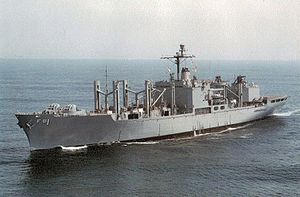
USS Mars (AFS‑1), the third United States Navy ship to bear the name, was laid down by the National Steel and Shipbuilding Company in San Diego, California, on 5 May 1962; launched on 15 June 1963, sponsored by Mrs. Clyde Doyle, widow of Representative Clyde Doyle of California; and commissioned at Long Beach Naval Shipyard on 21 December 1963, with Captain Russel C. Medley in command.
Mars was the first of a new class that was intended to replace three types of supply ships: the AF (Store Ship), AKS (Stores Issue Ship), and AVS (Aviation Supply Ship). Two innovations were Boeing UH‑46 helicopters and an automatic highline shuttle transfer system to make a rapid transfer of supplies possible. To speed replenishment processing, Mars became the first ship in the Pacific Fleet to be equipped with a UNIVAC 1104 computer system.
Assigned to Service Squadron 1 (ServRon 1), Mars left San Diego on 16 March 1964 for Acapulco, Mexico, for shakedown, returning to San Diego on Easter Sunday. On 1 September she departed for the western Pacific, arriving at Yokosuka, Japan, on the 23rd. With Yokosuka as home port, the combat storeship operated from the Philippines to the South China Sea through the rest of the year.